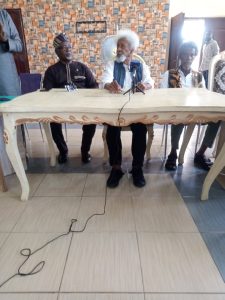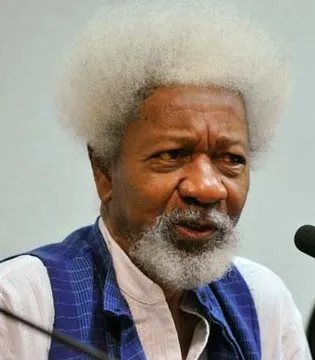Nobel Laureate, Professor Wole Soyinka, has likened Ilorin, the Kwara State capital, to Abu Dhabi, the United Emirates capital.
According to him, both represents unity of different tradtions.
The legendary writer made the comparison on Monday when he visited the University of Ilorin, where he also urged Africans to speak their languages to their children.
He had visited the Vice Chancellor of the University of Ilorin, Professor Wahab Egbewole, as part of activities leading up to the institution’s maiden Culture Week, organised by the Centre for Cultural Studies and Creative Arts, which had invited him.
He described Ilorin as a cultural melting pot, likening the Emirate City of Ilorin’s unique blending of diverse traditions and values to Abu Dhabi, capital of the United Arab Emirates.
Soyinka said, “Ilorin serves as a meeting point of cultures, making it a highly significant location for hosting an event that celebrates cultural diversity.”

He also said, “The significance of the programme of the Centre for Cultural Studies and Creative Arts of the University of Ilorin transcends the university and the host community, because it has broader implications for global understanding and peaceful coexistence.”
Drawing parallels from his experience as a Professor of Arts and Literature at New York University Abu Dhabi (NYUAD), the scholar of Comparative Literature highlighted the similarities between Ilorin and Abu Dhabi.
He said, “Abu Dhabi thrives on the expression of unity through various cultural traditions, a concept he considers fundamental to human existence.” He remarked that since he began teaching in Abu Dhabi, he has come to see Ilorin as a microcosm of what the Emirate represents — a dynamic intersection of global cultures.
While commending the University of Ilorin’s role in promoting global ecumenism, he expressed commitment to contributing in his own way to the continuity and advancement of the Centre for Cultural Studies and Creative Arts, adding that his life’s work has always revolved around arts and culture.
Answering questions from journalists after the visit, Soyinka urged African people to speak their language to their children, adding that they sustain their traditions.
Soyinka said, “Language is a repository of culture. Africans should allow their children to speak their language for the sustainability of their traditions.
“My mission in Ilorin is to implement all the plans of the Centre for Cultural Studies and Creative Arts,” Soyinka said.
Speaking earlier, the Vice Chancellor of the University of Ilorin, Prof. Wahab Egbewole, SAN, who said that the university does not take Professor Soyinka’s visit for granted, described it as a moment of pride and historical importance for the institution.
Egbewole, as the leader of the university’s management team, expressed the collective joy of the academic community at hosting a global cultural figure of Soyinka’s stature.
The Vice Chancellor revealed that the Centre was, in fact, conceptualised with figures like Soyinka in mind, saying that the initiative was born out of genuine intentions to contribute meaningfully to cultural scholarship and global discourse.
He explained that the vision for the Centre had been nurtured over time and has now materialised, with students enrolled in programmes across various levels, including diploma, undergraduate, master’s, and doctoral degrees.
The Vice Chancellor expressed optimism that the Centre would grow to become one of the foremost institutions of its kind globally, especially with the involvement and endorsement of Prof. Soyinka.
He also commended the Director of the Centre, Professor Raymond Ogunade, for taking on the responsibility of leading the initiative and steering it towards early success.
In his own remarks, the Director of the Centre, Professor Ogunade, expressed deep satisfaction at the realisation of his dream to bring Professor Soyinka to the University of Ilorin.
According to him, “it was a natural desire upon assuming office as pioneer Director to ensure Soyinka’s involvement in the Centre’s development, given his immense contributions to the world of arts and letters.”
He described “the Nobel Laureate’s presence at the university as a personal and professional fulfilment, noting that Soyinka’s participation in the Centre’s activities marks a significant milestone in its history and growth.”
Joining the Vice Chancellor to receive the international scholar were the university’s principal officers, council members, Committee of Provost and Deans, staff of the Centre, and other members of the University of Ilorin community.



